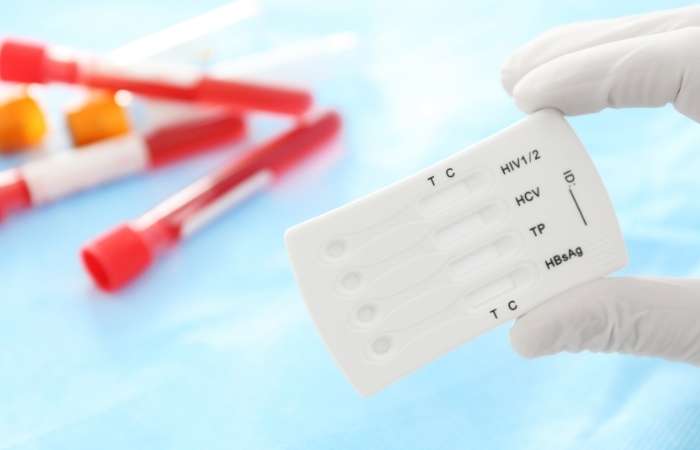How to Have Sex Again After a Herpes or Chlamydia Diagnosis
You’re Still Desirable: Let’s Start There
The moment that diagnosis hits, it can feel like a bomb went off in your sex life. Maybe you’re Googling what you did wrong. Maybe you’re panicking about never being touched again. Let’s clear something up fast: having an STD doesn’t make you dirty, broken, or unlovable. In fact, STDs are so common, 1 in 2 sexually active people will get one by 25, according to the CDC, that the real shock is that we still treat them like the end of romance. They're not. They’re the start of smarter, more honest sex. And if that makes you roll your eyes now, keep reading, we’re going to prove it. You can still have sex. You can still have *great* sex. You can still feel wanted, seductive, and totally in control. But first, let’s talk about how.
Understand What You’re Working With
Different STDs have different rules. What’s safe with chlamydia might not be enough for herpes. Here's your cheat sheet for managing your diagnosis without blowing up your sex life:
- Chlamydia / Gonorrhea: These are curable with antibiotics, but you must finish treatment and wait 7–10 days before any sexual contact. Get retested in 3 months.
- Herpes (HSV-1 or HSV-2): You can have sex between outbreaks with condoms and daily antivirals. Disclosure is key, don't wait until they’ve got their pants off.
- HIV: If you’re undetectable, you’re untransmittable (U=U). That means no risk with proper treatment. Still, communicate and use condoms or PrEP where appropriate.
- HPV: Most people have it, but it’s not always detectable. Vaccination helps. Condoms reduce, but don’t eliminate risk, communication and regular checkups matter.
The first step to safe sex is educated sex. Don’t rely on your memory of 8th grade health class, read the pamphlet, talk to a clinician, or visit resources like STD Rapid Test Kits to get accurate, updated info on your diagnosis.

People are also looking for: Can you rebuild sexual intimacy after an STD betrayal?
Disclose Before the Clothes Come Off
Let’s be real: this is the part that makes people want to crawl into a hole. Telling someone you have an STD feels vulnerable, awkward, and like it’s guaranteed to kill the vibe. But here’s the truth bomb: If someone ghosts you for having an STD, they were never safe to have sex with in the first place.
Disclosing builds safety. It shows respect, for them and for yourself. And when done right, it can even deepen intimacy.
Try something like: “Hey, before things go further, I want to be honest. I have an STD, it’s managed, and I take precautions to protect my partners. I’m happy to answer questions if you have any.”
This kind of clarity reduces fear and invites open dialogue. Most people respond better than you’d think, especially if you approach it with calm confidence instead of shame.
Yes, Protection Still Works, But Not All the Same Way
Condoms are a damn good tool, but they’re not a magic shield. Some STDs, like herpes or HPV, can still be transmitted through skin-to-skin contact in areas not covered. That’s why “safer sex” is smarter than “safe sex.” Here’s how to build a protection plan that matches your diagnosis:
- Condoms and dental dams: Still your front line. Latex, polyurethane, or nitrile barriers reduce transmission for most infections. Use them consistently, yes, even during oral.
- Medication: Daily antivirals (like valacyclovir for herpes) and ART for HIV reduce viral load and outbreak risk. If your partner is negative, they can use PrEP for extra protection.
- Timing matters: Avoid sex during outbreaks, flare-ups, or if you're still in treatment. That’s when risk is highest.
Think of this like tailoring a sex safety plan, not just a one-size-fits-all latex glove. Different STD, different rules. And if your partner’s into you, they’ll want to understand how to keep both of you safe.
Check Your STD Status in Minutes
Test at Home with Remedium7-in-1 STD Test Kit

 For Men & Women
For Men & Women Results in Minutes
Results in Minutes No Lab Needed
No Lab Needed Private & Discreet
Private & DiscreetOrder Now $129.00 $343.00
For all 7 tests
Pleasure Doesn’t Have to Pause
Let’s get something straight: an STD doesn't cancel out pleasure, it just invites you to get more creative. And maybe more intentional.
Here’s how people keep the heat alive after a diagnosis:
- Redefine “sex”: Not everything needs to involve penetration. Hands, mouths, toys, dirty talk, sex is broader and richer than we give it credit for.
- Communicate turn-ons and boundaries: When you’re navigating a new normal, clarity becomes sexy. Tell your partner what feels good, and what’s off limits during a flare-up.
- Use lube, toys, and positioning: If your body’s healing or reacting differently, switch things up. Some STDs or meds can cause dryness or irritation, lube helps more than you think.
A 2023 study from The Journal of Sex Research found that people who approached sex after an STD diagnosis with openness and creativity actually reported increased satisfaction over time. Not because the diagnosis was fun, but because it forced them to communicate better and prioritize consent.
Mental Health: The Bedroom Saboteur No One Talks About
Shame is the most common STD symptom. And it’s the one no swab can detect.
After a diagnosis, people often feel like they’ve lost control of their body, their reputation, and their sex life. That anxiety leaks into intimacy, some avoid sex altogether, others perform through panic. Neither is sustainable.
Here’s what helps:
- Talk to a therapist or support group: There are herpes-positive forums, HIV peer communities, and sexual health therapists trained for this exact terrain.
- Don’t internalize the stigma: STDs are infections, not indictments. If your brain tries to equate your diagnosis with “dirty,” remind it that strep throat doesn’t make you unworthy.
- Practice pleasure solo: Masturbation can help rebuild comfort, confidence, and a sense of agency over your own body.
A herpes-positive Redditor described it like this:
“I didn’t feel sexy again until I gave myself permission to feel good. Once I stopped thinking of myself as contaminated, I started feeling like a partner again.”
That’s the goal. Not perfection, just permission.

People are also looking for: Can chlamydia go away by itself?
Dating, Love, and Long-Term Relationships with an STD
Let’s kill this myth once and for all: you are not doomed to a lonely sexless life just because you tested positive for something.
In fact, people date, marry, and build entire families while managing STDs. The key ingredients? Disclosure, mutual respect, and clear boundaries.
Here’s how real people make it work:
- Be upfront, but not apologetic: You don’t owe anyone shame. Just honesty. The right partner will respect that.
- Find your rhythm: Some couples use condoms forever, some stop after treatment, others use meds plus periodic testing. There’s no one-size-fits-all, but you have options.
- Don’t rush the emotional part: Sex might feel scary after a diagnosis. You might overcompensate or shut down. Give yourself time, and give your partner guidance.
If someone says “thanks for telling me,” and still wants to touch you? That’s not luck. That’s what safe, mature intimacy actually looks like.
Common Myths That Keep You Stuck (and the Truth)
Let’s bust some of the biggest lies keeping people in fear loops:
- Myth: “No one will want me now.” Truth: Millions of people live with STDs and still date, hook up, and fall in love.
- Myth: “I have to disclose before every kiss.” Truth: You’re not morally required to over-disclose. Focus on risk-related activities, not hand-holding or casual flirting.
- Myth: “If I use a condom, I don’t need to say anything.” Truth: Barriers help, but honesty builds consent. Don’t hide behind latex.
- Myth: “Sex won’t be fun anymore.” Truth: People report better communication and more satisfying sex after navigating an STD openly.
The fear is real, but so is the freedom on the other side of it.
Check Your STD Status in Minutes
Test at Home with Remedium6-in-1 STD Rapid Test Kit

 For Men & Women
For Men & Women Results in Minutes
Results in Minutes No Lab Needed
No Lab Needed Private & Discreet
Private & DiscreetOrder Now $119.00 $294.00
For all 6 tests
FAQ
1. Can I still have sex if I have herpes?
Yes, with precautions. Avoid sex during outbreaks, use condoms, and consider daily antivirals to reduce transmission risk.
2. Is it illegal to not tell someone you have an STD?
In many regions, yes, especially for infections like HIV. But even when not required by law, ethical disclosure is part of informed consent.
3. What’s the safest STD to have?
There’s no “safe” STD, but some, like Chlamydia or Gonorrhea, are easily curable if caught early. Others are manageable long-term.
4. How long should I wait after treatment to have sex?
It depends on the infection. For bacterial STDs, usually 7–10 days after finishing antibiotics. Always confirm with your provider.
5. Can I get an STD again after treatment?
Yes. Curing an STD doesn’t make you immune. Re-infection can happen through unprotected sex with a partner who still carries it.
6. Do condoms protect against all STDs?
They significantly reduce risk, but not 100%. Skin-to-skin STDs like herpes and HPV can still transmit outside the covered area.
7. How do I start the disclosure conversation?
Be direct, calm, and honest. Mention your diagnosis, how you manage it, and invite questions. Timing matters, do it before sex, not during.
8. What if my partner rejects me?
It hurts, but it's also a filter. If someone can't handle mature sexual health, they weren’t right for you anyway.
9. Can I have kids with an STD?
Absolutely. Many STDs have zero impact on fertility if treated early. Some require medical guidance, but parenthood is still possible.
10. Is there a dating app for people with STDs?
Yes, apps like PositiveSingles and MPWH are designed for people with herpes, HIV, and other STDs who want connection without stigma.
Sources
Sex After STD Diagnosis – Everlywell
Life After STIs: The Therapist’s Role – Institute for Relational Intimacy
Can I Still Have a Healthy Sex Life if I Have an STI? – ISSM
8 Tips for Coping with a Positive STI Diagnosis – Docs Medical Group










